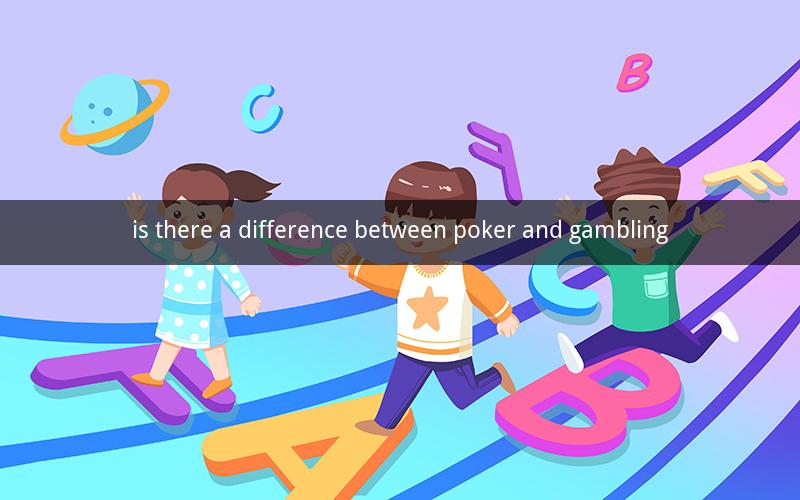
Table of Contents
1. Understanding Poker
2. Understanding Gambling
3. Key Differences Between Poker and Gambling
- Skill vs. Chance
- Strategy and Tactics
- Social Aspect
- Legal Considerations
4. Similarities Between Poker and Gambling
5. The Evolution of Poker and Gambling
6. Conclusion
1. Understanding Poker
Poker is a card game that has been played for centuries. It is a game of skill, strategy, and psychology. The objective is to win the pot, which is the sum of all the bets made during the game. Poker can be played in various formats, including Texas Hold'em, Omaha, Seven-card stud, and more.
The game of poker requires players to make decisions based on the cards they are dealt, as well as the actions of their opponents. Players must bluff, read their opponents, and make calculated bets to win the pot. Poker is a game that can be played with any number of players, but the most common format is with six to ten players.
2. Understanding Gambling
Gambling, on the other hand, is the act of betting something of value on an event with an uncertain outcome, with the primary intent of winning more money or material goods. It can take many forms, such as playing casino games, betting on sports, or participating in lottery games.
Gambling is often considered to be a form of entertainment, but it can also be addictive and have negative consequences. The outcome of a gambling event is determined by chance, and there is no guarantee of winning.
3. Key Differences Between Poker and Gambling
Skill vs. Chance
One of the most significant differences between poker and gambling is the role of skill. In poker, players use their knowledge of the game, their ability to read opponents, and their strategic decisions to gain an advantage. In contrast, gambling relies primarily on chance, and the outcome is determined by luck.
Strategy and Tactics
Poker requires players to use various strategies and tactics to gain an advantage over their opponents. This includes bluffing, reading opponents, and making calculated bets. In gambling, players may use strategies to increase their chances of winning, but these strategies are often less sophisticated than those used in poker.
Social Aspect
Poker is often played in a social setting, with players interacting with each other and forming relationships. This social aspect is an integral part of the game and can add to the overall experience. In contrast, gambling is often a solitary activity, with players focusing on the game and their chances of winning.
Legal Considerations
The legality of poker and gambling varies by country and region. Poker is often considered a game of skill and is legal in many places, while gambling is often regulated and may be illegal in some areas.
4. Similarities Between Poker and Gambling
Despite their differences, poker and gambling share some similarities. Both involve betting money on an uncertain outcome, and both can be entertaining and exciting. Additionally, both can have negative consequences if not approached responsibly.
5. The Evolution of Poker and Gambling
Both poker and gambling have evolved over time. Poker has become more popular and accessible, with online poker sites and tournaments attracting players from all over the world. Gambling has also seen significant changes, with the rise of online casinos and sports betting platforms.
6. Conclusion
In conclusion, while there are significant differences between poker and gambling, they also share some similarities. Poker is a game of skill and strategy, while gambling relies primarily on chance. Understanding these differences can help players make informed decisions about their participation in these activities.
Questions and Answers
1. What is the main difference between poker and gambling?
- The main difference is that poker is a game of skill, while gambling relies primarily on chance.
2. Can poker be considered a form of gambling?
- Yes, poker can be considered a form of gambling, as it involves betting money on an uncertain outcome.
3. Is poker more popular than gambling?
- The popularity of poker and gambling varies by region and over time, but poker has seen significant growth in recent years.
4. What are some popular poker formats?
- Some popular poker formats include Texas Hold'em, Omaha, Seven-card stud, and Razz.
5. Can poker be addictive?
- Yes, poker can be addictive, just like any other form of gambling.
6. What are some strategies used in poker?
- Some strategies used in poker include bluffing, reading opponents, and making calculated bets.
7. How has the internet affected the popularity of poker?
- The internet has made poker more accessible and has contributed to its increased popularity.
8. What are some legal considerations when playing poker?
- The legality of poker varies by country and region, so players should be aware of the laws in their area.
9. Can poker be considered a sport?
- Some people consider poker a sport due to its competitive nature and the skill required to play well.
10. What are some potential negative consequences of gambling?
- Potential negative consequences of gambling include addiction, financial problems, and mental health issues.